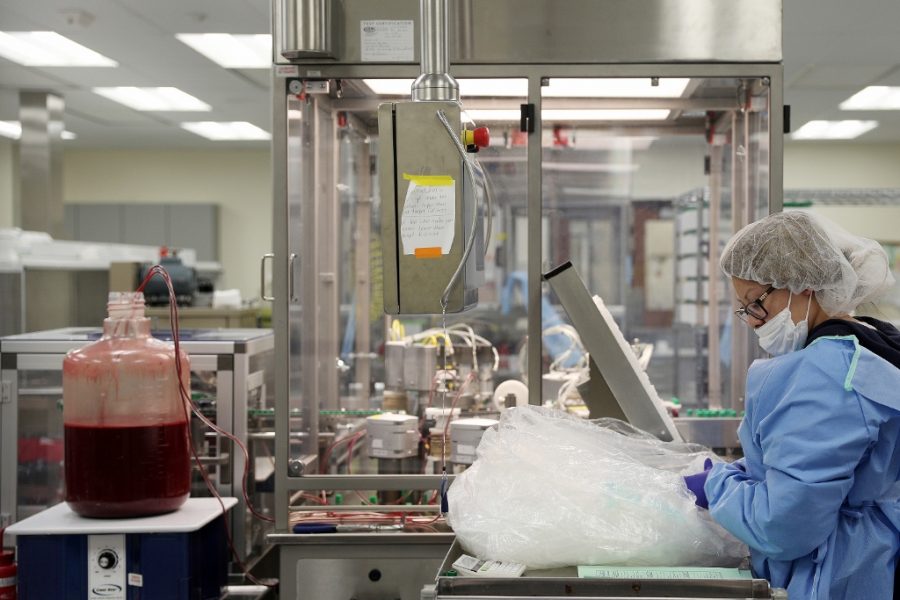Biotech firm carves a large niche in tools for research
Bio-Techne sees the potential for some of its most exciting and lucrative contributions to science and precision medicine as the industry matures. (Anthony Souffle/Minneapolis Star Tribune/TNS)
March 16, 2017
MINNEAPOLIS — More than 600,000 times, researchers have cited Bio-Techne Corp. in academic papers as a manufacturer of tools that helped in their search for new tests and treatments.
The company, Minnesota’s biggest biotech company, makes tiny bits of biology plus analytical machines and kits used in academic laboratories and pharmaceutical research and development labs worldwide. Its customers are trying to solve some of the most pressing questions in life sciences, from the vagaries of gene expression to drugs for cancer, autoimmune diseases and diabetes.
Now the dawn of the age of precision medicine therapies like cancer immunotherapy holds the potential for some of the company’s most exciting and lucrative contributions to science.
Minneapolis-based Bio-Techne has gone on a bit of a tear in recent years, with revenue cresting at an all-time high of half a billion dollars last year and three analyst firms initiating coverage with optimistic outlooks since the start of 2017. An aggressive run of acquisitions and management changes since 2013 has come with new transparency and goal-setting, and analysts say the difference shows.
“We consider the company the top strategic asset in an increasingly target-poor life science tools industry,” Deutsche Bank Securities analyst Dan Leonard wrote in January, placing a “buy” rating on Bio-Techne stock with a target price of $115 a share. The stock stood just under $107 as of market close Tuesday.
Bio-Techne has produced dependable wet-lab research tools for decades, which helps explain why so many University of Minnesota biology grads want to work there. Nearly a third of the company’s workforce has a degree from the university.
Analysts like how Bio-Techne is growing, combining well-considered acquisition targets with the company’s long-running reputation for producing top-quality raw proteins and antibodies for use in research.
In 2014, Bio-Techne paid $300 million to acquire a molecular diagnostics device company called ProteinSimple. That portfolio included a machine called Wes, which retails for about $60,000 and was the first device to automate the common — and commonly frustrating — research method called the Western Blot. The Wes requires higher-margin “consumable” Western Blot products, which are also sold by Bio-Techne.
“That’s $60,000 in revenue, but after that, in order to operate the system (users) are going to need the cartridges,” Leerink Partners analyst Puneet Souda said in an interview. “Once your installed base starts growing, that starts to drive your consumables. This is a very good consumables company, so we know they will execute well on that end. That’s something I see as a major growth driver in the future.”
Bio-Techne has set an ambitious goal of hitting $1 billion in annual revenue through a combination of internal innovation and well-curated acquisitions.
It recently launched its first entry in the veterinary products market: a test system for common pet parasites that contains the industry’s only nontoxic biodegradable chemical preservative. The company has also made moves to expand its footprint in stem cell science, striking a new co-development and licensing agreement with a small biotech startup in Connecticut called MultiClonal Therapeutics.
Until a few years ago, the company was run by longtime CEO Thomas Oland, who smoked in the office, disdained travel budgets and refused to put a computer on his desk. Oland helped build a public company with a strong reputation for dependability and quality, but he never did a quarterly earnings call or a “roadshow” for investors.
Oland’s conservative financial philosophy left the company with a full year and half worth of revenue sitting in the bank.
“You have to hand it to him — he had a huge hand in building this business. No question about that,” said Struan Robertson, a vice president with the company. “But when you take a (CEO) in 2012 who doesn’t have a computer on his desk because he doesn’t really think you need them, and smokes in the building, you think, ‘This is some old-school thinking.’”
A painful leadership succession was triggered in 2012, in which Oland resigned from the company earlier than expected, and his preferred internal candidate for CEO was bypassed in favor of former 3M executive Charles “Chuck” Kummeth, 56.
Oland, who has since passed away, warned shareholders in a public securities filing that turning to an outsider like Kummeth to become CEO would “put at risk all that we and our employees have built over the past 30 years.”
The stock price has increased by 57 percent since Oland wrote those words in October 2012.
Since Kummeth became CEO in 2013, the company has brought in 12 new executives, completed acquisitions of nine companies, and grown annual revenue 60 percent, to $499 million in fiscal 2016. Adjusted profit grew 14 percent between 2013 and 2016, to $134 million.
Kummeth ran the company’s first-ever quarterly earnings call, in 2013. In 2014, the company changed its brand name from Techne to Bio-Techne, reflecting its mission of serving the global biotech community. The name change was also needed because Kummeth discovered no one had ever registered the name “Techne” in the first place, he said.
“The funny thing about this company is, it’s 40 years told, but the doors were locked to the public until I arrived,” Kummeth said. “There was a lot of low-hanging fruit here to change to make some real quick impact. And the stock started moving pretty quickly.”
———
Bio-Techne at a glance
Headquarters: Minneapolis
NASDAQ stock ticker: TECH
Employees: About 1,700
Offices globally: 24
2016 revenue: $499 million
Market capitalization: $4.03 billion








